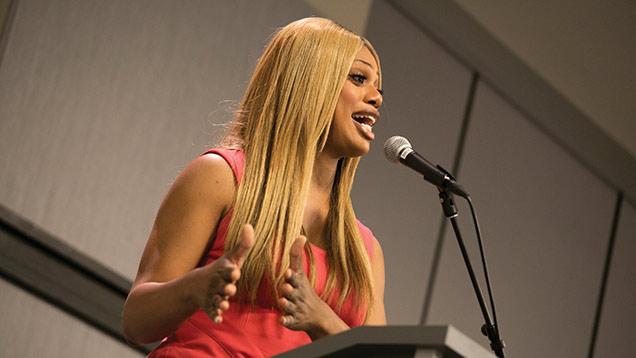Gender roles in media
 CREDIT: "PRIDE LECTURE FEATURING LAVERNE COX" BY UMKC ON FLICKR (CC BY-NC 2.0)
CREDIT: "PRIDE LECTURE FEATURING LAVERNE COX" BY UMKC ON FLICKR (CC BY-NC 2.0)Laverne Cox has been a great representative and ground-breaker for the transgender community.
There has been a marked, positive change in the way that characters of differing gender identities are portrayed in media. For a long time, these characters were relegated to minor roles, at best as a supporting protagonist, and at worst as a sloppy punch line.
Now, programs and movies about – or prominently featuring LGBTQA characters and performers – are among the most popular and critically acclaimed media available today, which has begun to move the conversation about diverse gender roles in a more positive direction.
It’s no secret that for a long time, the general attitude toward the LGBTQA has been generally appalling, and that there is still a long way to go before a state of equality is to be reached, and perhaps even longer before negative social stigmas are removed, but recent signs seem to indicate that, at least in Hollywood, the winds have begun to change.
One of the most significant and high profile contributors to this recent phenomenon is the rise of web-based television, allowing creators significantly more freedom to explore than would be given on a more traditional cable network. A lot of it is financial, and a lot more has to do with the out-dated views of some billionaire CEOs at the head of these networks, but whatever the true reasoning behind it is, web-based networks like Netflix and Amazon have become the home of some of the most progressive television ever to be aired.
Leading the way is Netflix’s original series Orange is the New Black, which is one of the most popular and highest rated series on television. It’s a standout program for both the portrayal of LGBTQA characters, and the employment of performers who count themselves a part of that community.
A lot of the early attention deservedly went to Laverne Cox, who portrays transgender inmate Sophia Burset, a character who has grown in both popularity and significance as the series has progressed. According to the actress, many of the storylines that have been crafted for Sophia are designed to directly influence major issues facing trans women in the prison system, and for the most part, have been portraying those issues accurately.
Despite how easily the character could have turned out to be yet another transgender stereotype, Cox successfully portrays Sophia in a truly relatable human way, aided in no small part to her own experiences during her transition. She has successfully broken down several barriers already, becoming the first openly trans person to receive an Emmy nomination for acting, as well as the first to appear on the cover of Time magazine.
While Cox has become the face of Orange is the New Black’s diverse cast, there are a number of other notable queer performers in the ensemble, notably Australian actress Ruby Rose and Lea DeLaria. Rose, a gender fluid former Australian VJ, became something of a viral sensation after her role as Stella in the third season catapulted her to international fame. DeLaria, who has portrayed Big Boo since the series’ inception, holds the distinction of being the first openly gay comic to appear on a late-night talk show when she appeared on a 1993 episode of The Arsenio Hall Show.
The increased exposure that the LGBTQA community has been receiving is having an influence on more than what is just being seen on television, it has helped to open new lines of dialogue in new crowds of people.
“The increasing media attention has been a little odd, I find myself answering more and more questions about the community,” said Avalon Zanoni through email. Zanoni is a coercively assigned male at birth (CAMAB) trans-woman and chef based in Seattle.
For her, seeing characters she can relate to on television is a welcome change.
“I am, first and foremost, an anime fan. I had to look up who Ruby Rose was to be honest,” she said. “My media of choice has shown me representations of myself for decades and was my outlet while struggling to find characters to relate to when American media turned up bankrupt.”
For a group of people who have spent so long living under the fear of social persecution, there is a long way to go before stigmas have been completely wiped away. This past year was full of progress for the LGBTQA community on many fronts, far more important that in media. But it’s a step in the right direction.
Zanoni says she appreciates the opportunities being given to trans performers, but acknowledges that Hollywood still has a ways to go.
“While there’s no such thing as bad publicity, there are still many portrayals that are very misinformed,” she said. “There’s definitely no bad publicity, but there is a lot of responsibility put on writers to make sure they are truly representing trans people.”














